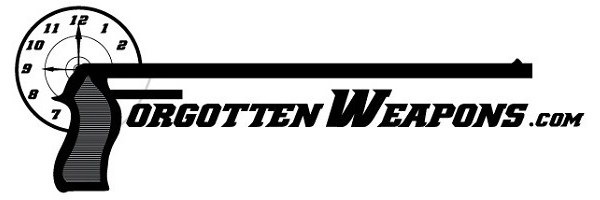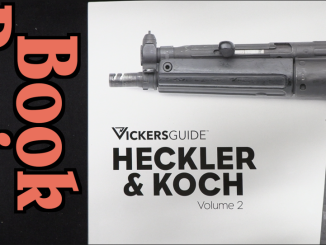We previously got to take a look at a Hino-Komuro, a Japanese blow-forward automatic pistol dating from 1908 – and today we have another blow-forward from 1908. Andreas Schwarzlose (best known for his 1907 and 07/12 machine guns) designed this pistol for military and civilian use, and it saw minor commercial success. The blow-forward action was pretty much a developmental dead end, because it made for unusually sharp recoil and was potentially unsafe to handle – the only three commercially available pistols made this way were the Hino, the Schwarzlose, and the Mannlicher 1894 (which was quickly replaced by better Mannlicher designs). The Swiss did tinker a bit with a blow-forward action in their AK-52/53 rifle as well, but this ultimately went nowhere.
Anyway, stick around and have a look at how the 1908 Schwarzlose operates, disassembles, and shoots!




Falls in the “better forgotten” design category by your description, so it’s amazing what all was selling at the time (as you said, no one knew where things would be going). BTW the last e is not silent in German, you’re cutting Mr Schwarzlose a bit short.
Molte grazie!
or should that be “vielen dank” when it’s a German pistol?
When I was going through the patents for the Schwarzlose, I didn’t pay too much attention to the trigger and hammer mechanism – it’s clever, probably a bit too clever, and I’m going to have to watch the vid again tonight to see how that grip safety interacts.
At the time I was first reading up on blow forwards, I was thinking in terms of an ultra compact pocket pistol, without all of the space that is wasted by the rear part of a Browning slide (looking at some of the snubby 9mm guns, that part of the slide is longer than the barrel), and which allowed a really low bore axis without a slide ploughing furrows through the web of the firing hand.
With that in mind, I was thinking of double action only – like a Semmerling or a shrouded hammer snubby revolver.
Seeing your vid, the front grip safety looks reminiscent (preminiscent?) of the H&K P7 and of the third party squeeze cocking mods on the mainspring housing of a 1911, even if it is only a grip safety.
Is the P7 a forgotten weapon yet? with its niche stolen by the much easier to negligently shoot yourself with Glock and its spawn?
The Roth Steyr, with its partial double action (later recycled by Glock), exagerates and makes a design virtue out of a necessity that any trigger must have to be safe,
To be safe, a trigger must cam the striker / hammer back slightly before it releases it, so that if the partially pulled trigger is released before it fires, the mainspring of the striker/hammer will cam the sear back into full engagement again.
If over pronounced, (as it usually is with an open bolt)this camming back of the striker makes for a heavy creepy trigger pull. I once toyed with an idea for a cleaner breaking trigger for a Gevarm semi auto open bolt .22, and rapidly abandoned the idea as a modified trigger could easily land me in very serious trouble.
Back later with questions about feeding and whether the feeding round is controlled or just sitting there waiting for the chamber to swallow it. The Semmerling has an extended lip at the front of the mag which holds a loaded cartridge from falling out of the gun as it is being fed. The entrance to the chamber pushes the lip aside and there is a slot in the one piece barrel / slide, where it fits when the action is closed.
a late update, here’s a link to a schwarzlose patent for a blow forward’s lock and grip safety:
http://worldwide.espacenet.com/publicationDetails/originalDocument?CC=US&NR=932183A&KC=A&FT=D&ND=3&date=19090824&DB=EPODOC&locale=en_EP
note that the patent drawings show a recoil spring mounted around the barrel, rather than below the barrel – like your test gun.
and here’s a British patent for the 1908 under barrel recoil spring and its method of stripping:
http://worldwide.espacenet.com/publicationDetails/originalDocument?CC=GB&NR=190810222A&KC=A&FT=D&ND=3&date=19080806&DB=EPODOC&locale=en_EP
looks like there are still more interesting Schwarzlose patents to look through.
The Kaiser Wilhelm had Swartsloose 1908 No. 1, with his monogram in the gripplates in gold and platin. I sold it to an american in the 70ties, what then was a lot of money. It was found in Görings yagt, that somehow ended up in Copenhagen. Now I only hawe a plain one, factory no. 3
Peter R
R.L. Hillberg of HiStd designer of the Sears Model 60 the firdt gas-operated shotgun had designed a blow forward carbine while at Bell Aircraft. It was quickly rejected.
I think that the Hillberg carbine you are thinking of is already featured on this site: https://www.forgottenweapons.com/light-rifle-program/hillberg-carbine/
Ian, out of curiousity, how would you compare the actual magnitude of the felt recoil vis-a-vis more conventional semi-automatic pistols in the same 7.65mm Browning ( .32 ACP ) caliber? I think I understand that the rather sharp recoil impulse would probably magnify the perceived quality of that recoil significantly, but allowing for this, would you say that it ends up feeling like the “kick” or “push” you would associate with a .380 auto or similar larger caliber fired from a rearward-recoiling mechanism?
Longest lived blow forward pistol ever produced.
Its grip safety may be thought as forerunner of
HK P7 trigger mechanism and ıt was a pity for P7
not having a lever retainer latch like Schwarzlose 08
since one of most complained featue of P7 was to
hold the cocking lever on squezzed position.
They are located in the same place, but the grip safety of the Schwarzlose doesn’t do anything other than block the trigger from moving. It may have been a conceptual inspiration for the P7, but definitely not a mechanical one.
Of course a certain difference is present. Squezze
lever of P7 cocks the firing mechanism and Sch.08’s
only blocks the trigger movement. But gripping concept
is same and not as natural as actuating a grip safety
located at back strap which automatically happens when
handled. Front strap mounted grip safeties need some
additional force to maintain the gripped form and on
P7 cocking lever, though main spring force is halted
by cocking lever latch on squezzed form, the lever own
spring tension is still present and a latch arresting
the drag lever on cocked position and being released
by ungripping middle finger instead of returning
cocking lever would be useful for users wlth rather
weak hands.
I believe the extremely weird/cool Becker revolver-shotgun used a blow-forward action too. Quite how that one works, I’ve no idea, but it does according to Taylerson.
excellent vid but I don’t understand when the disconnect of the trigger occurs.
Ooops I think it’s the same way of the breech “locking” security.
How does the recoil compare to just a single shot 32? I mean recoil is recoil. Is it because of the grip design that makes it feel stiffer? Or you just comparing it to other semi-auto 32 pistols?
nice litle pistol to look at. but firing is a quite different matter, the small 32 acp cartridge, maks in this pistol, makes an unplsant recoil.
i once ownd serial no 1 witch had the kaiser wilhelm crest in gold and platin in the grips, i sold it many years ago to fred datig, curently, i hav serial no.3